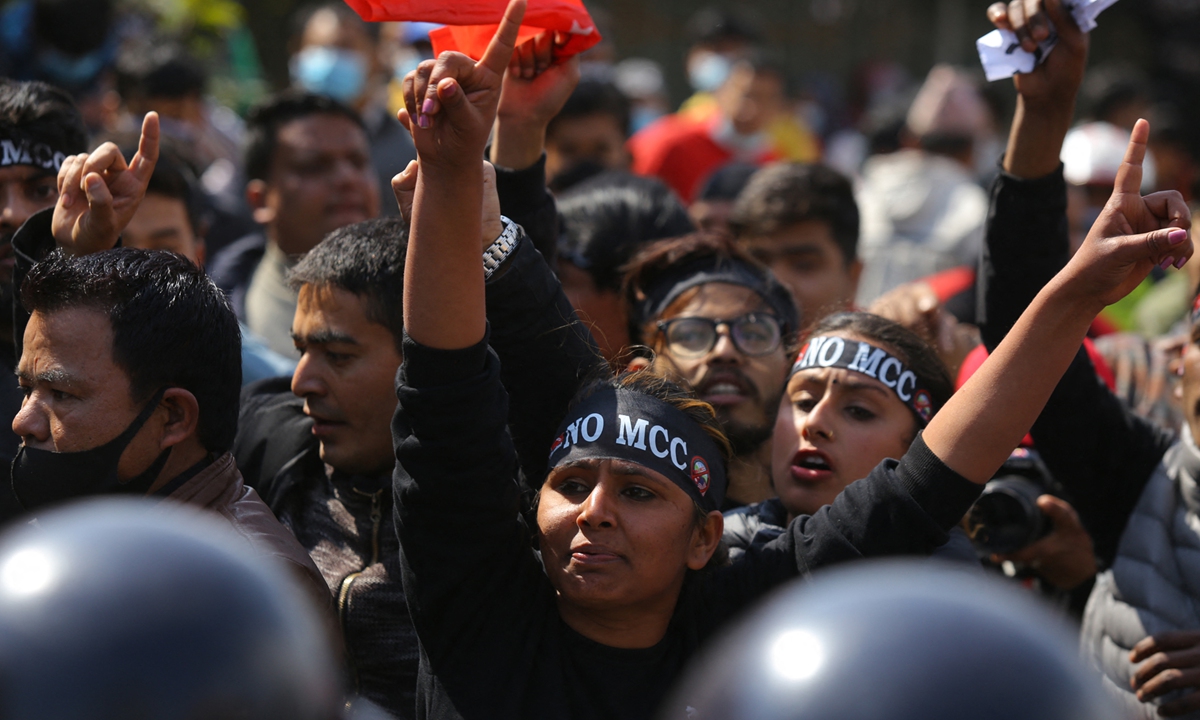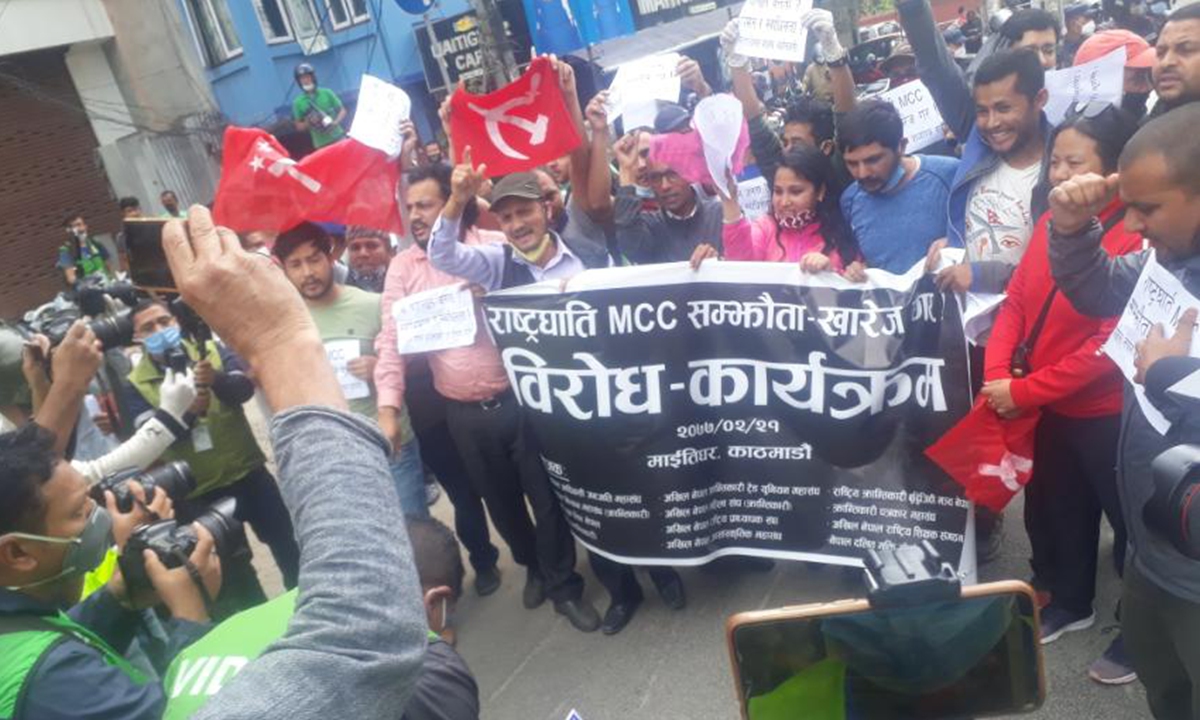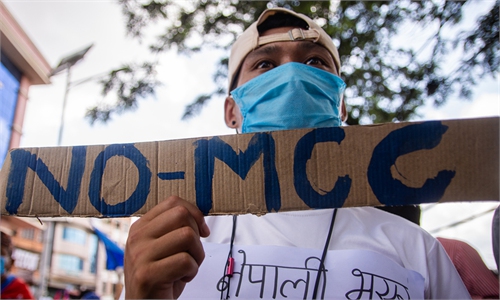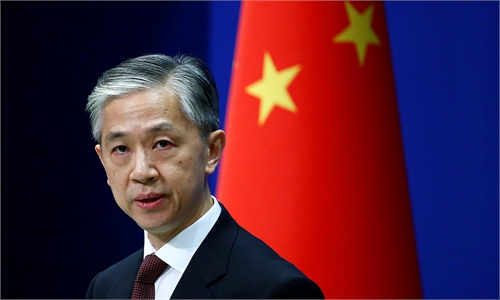IN-DEPTH / IN-DEPTH
Looting in name of democracy: How US pulls the strings behind controversial MCC deal with Nepal?
Poisoned pact

Nepalese protest against the MCC in Kathmandu, Nepal on February 20, 2022. Photo: AFP
Fierce street protests, burnt American flags, chants demanding "say no to MCC," traffic standstills, and violent clashes between crowds and police - Kathmandu was turned into a battlefield thanks to an enforced "gift" from the US - Millennium Challenge Corporation (MCC), a bid to give $500 million for Nepal's infrastructure aid, but with strings attached.Ongoing protests recently reached a climax as the US urged an approval of MCC by February 28 or Washington would "review its ties with Nepal."
Who are forces behind deal push and what are their tools for forcing controversial implementation?
Kathmandu and other cities in Nepal have, in the recent past, witnessed frequent protest rallies against the MCC deal. Critics of the compact in Nepal see it as the undermining of Nepal's sovereignty, integrity, and constitutional autonomy through unjustifiable provisions.
The MCC deal even caused further divisions in Nepali politics. The Global Times found that there were combined efforts behind the drive amid the controversy.
Widely seen as part of the US' Indo-Pacific Strategy's push to further contain China, the MCC deal has been called a tool of modern imperialism. Behind this aggressive push, the US' true intentions - expanding US national interests and strategy under financial aid pretenses - have become crystal clear.
Combined tools
Nepal and the US signed the MCC agreement in 2017. The US stated the deal was designed to improve Nepal's infrastructure. But Nepal's Parliament has not ratified the compact, as Nepal's political parties are sharply divided on whether to accept it with concerns that the MCC will hurt Nepal's sovereignty.
Against such disagreement, the US has massively mobilized - pressuring and wooing - activists and key influencers to speak in favor of MCC, including politicians from coalition ruling party, the Nepali Congress Party (NCP), a political party in Nepal widely tagged as a pro-India force, and was considered the main institution behind some rumors against China, observers in Nepal told the Global Times.
"We can sense that the Americans have mobilized all Nepali political leaders, academicians, intellectuals, and journalists among others, who are under their influence to lobby for MCC," Pushpa Raj Pradhan, a veteran Nepalese political observer, and also editor-in-chief of the Nepalese media People's Review Weekly, told the Global Times.
American assistant secretary for South and Central Asian Affairs Donald Lu on February 10 called Prime Minister Deuba, opposition party leader K.P. Sharma Oli, and Maoist Center chair Pushpakamal Dahal Prachanda and warned the possible reviewing of America's relations with Nepal, according to local media.
"Such warnings made Nepalis more suspicious of the MCC grant project," Pushpa said.
Nepal's former Prime Minister, Jhalanath Khanal, has claimed that the Sher Bahadur Deuba-led government tabled the MCC agreement in parliament "after he was unable to bear the US pressure."
"While studying the MCC deal document it's been found that after ratifying the grant agreement, Nepal has to abide by the US National Security Concept, which is not acceptable to Nepal," Khanal was quoted as saying by local media "My Republica." Stating that Nepal has to abide by the conditions of a liberal economy, a liberal democracy, and market and economy, in present and future American laws after ratifying the MCC grant agreement, Khanal said that the project should not be passed by parliament at any cost.
The second of US' tool in trumpeting MCC is to launch aggressive media campaigns, including the state media, private media, and social media.
A screenshot of the document circulating on local Nepali social media shows that the US invested $1 million to "increase MCC publicity." The document, which cannot be immediately verified by the Global Times, said "It is proposed to hire well-established private companies in Nepal to send SMS messages to a large number of Nepalis," and "launch a sustained but discreet campaign to support MCC with the help of Think Tanks, journalists, TV anchors, selected politicians academicians, etc."
A third typical tool being used by the US to promote the MCC is to discredit China's role in Nepal, as the US has long slandered China for "actively fomenting or encouraging or funding, or facilitating" a disinformation campaign in Nepal against the proposed aid.
But it is the US that has, in fact, been stoking anti-Chinese sentiment in Nepal during the MCC controversy, by releasing such rumors as the "border dispute between China and Nepal," and "China's intelligence agency engaged in propaganda against US Aid in Nepal" to destroy China-Nepal relations.
There are also some pro-India political forces behind these rumors, such as Nepali Congress Party lawmaker from Karnali Province, Jeevan Bahadur Shahi, who has been an initiator of accusation "China is encroaching on Nepalese land along the border."
"The border encroachment issue with China often surfaces whenever other issues are debated in Nepal. For instance in the past, when border encroachment by India was raised, it was later followed by a Nepal-China border issue. Now, as the endorsement of MCC compact enters high debate stages in Kathmandu, this issue has again been brought up…," Shristi Kafle, a Kathmandu-based independent journalist, told the Global Times in a previous interview.
The US has smeared China in an attempt to achieve its own geostrategic goals by sowing discord and creating a rift between China and Nepal. But China and Nepal's long-term friendly and cooperative relationship won't be affected, which is the very thing that the US does not want to see, said observers.
Why protests
The MCC is a US agency that provides assistance to lower-income countries that can only "qualify" if they "demonstrate a commitment to just and democratic governance, investments in its people, and economic freedom," according to MCC's selection rules.
Though self-proclaimed as an "independent agency," the MCC was in fact established by the US Congress in 2004.
Observers have revealed its state-controlled nature and called it one of the world's high-profile and large-scale state-owned enterprises (SOE) considering its relationship to the US power structure.

Nepalese protest against the MCC compact in Kathmandu on June 3, 2020. Photo: Courtesy of a local observer
The MCC Board of Directors is comprised of the US secretary of state (Chair), treasury secretary, US trade representative, USAID administrator, CEO of MCC, and four private sector members appointed by the US president as advised by and consented to by the Senate.The Communist Party of Nepal (Unified Marxist-Leninist)'s leader Bhim Rawal has said to the media that the US wants to control India through MCC. "The US intends to loot in the name of democracy. There is an attempt to rob Nepal through MCC."
Section 7.1 of the Compact to Nepal reads, "The Parties understand that this Compact, upon entry into force, will prevail over the domestic laws of Nepal." Furthermore, its auditing will be done by American rather than Nepali auditors.
These critics also see the compact as a part of the US' Indo-Pacific military strategy, which clearly targets China.
MCC's cooperation with Nepal began as early as 2011, when MCC selected Nepal as a site for a trial project, but subsequently expanded the funding dramatically in 2014 in consideration of the US Indo-Pacific strategy, pushing an agreement signed in 2017, Zhang Yongpan, a research fellow at the Institute of Chinese Borderland Studies under the Chinese Academy of Social Sciences, told the Global Times.
Some political parties went against it because the aid pack was marginal at only $500 million and required the government of Nepal's commitment for an additional $130 million to support MCC's investment. This so-called "gift" actually exposes Nepal to greater financial pressures that are hard to refute, Zhang said.
India also attempts to step in and support the MCC project in Nepal as the prospective cross-border transmission line between India and Nepal could bring India more hydropower exportation and further support India's control of Nepal's energy landscape, Zhang said. In addition, the implementation of the MCC will also benefit India over its encroachment of Nepali territory.
It is highly likely that the US is using infrastructure projects at the Indo-Nepal border to strengthen Nepal's dependence and integration with India, Long Xingchun, a senior research fellow at the Beijing Foreign Studies University, suggested. Many oppose the project because they fear that Nepal could be further engulfed by India.



